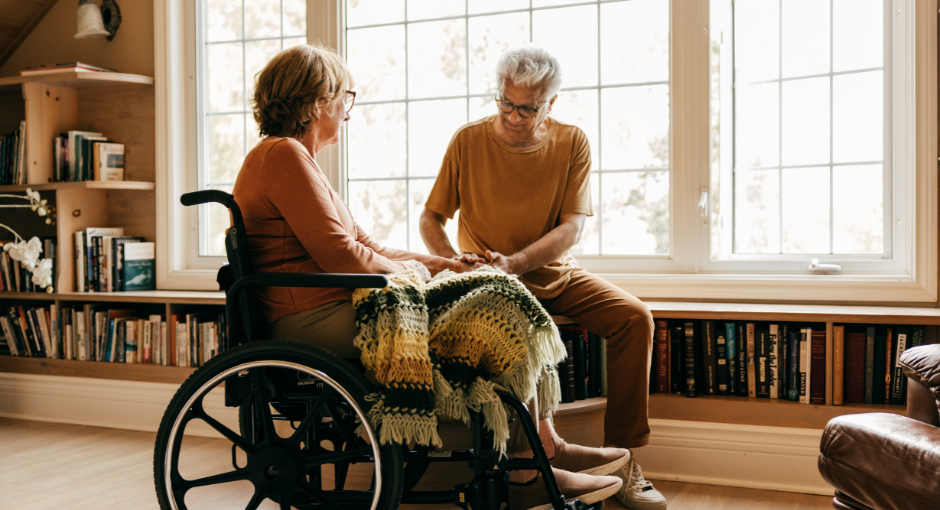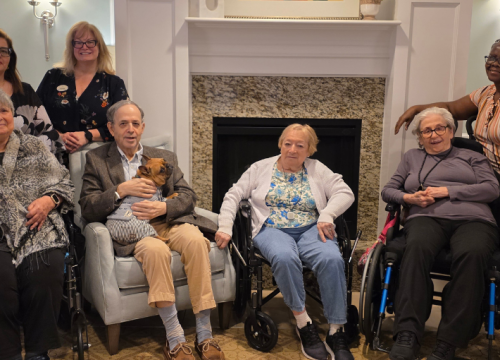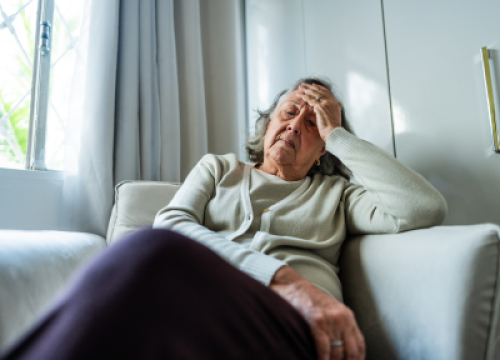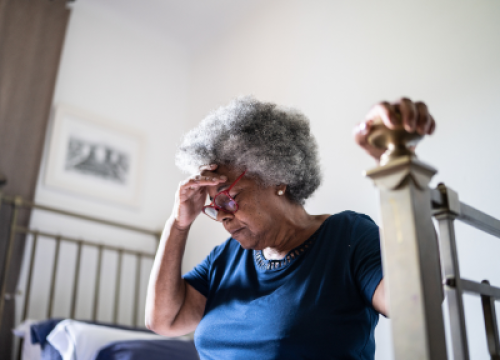Advanced Parkinson’s Care: Practical Ways to Help Your Loved One

As Parkinson’s disease (PD) progresses, care needs become more complex. Advanced PD stages can bring greater changes in movement, thinking and daily function. For care partners, this stage can feel overwhelming, but with the right tools and support, you can provide care with confidence.
From managing daily routines to supporting your own well-being, this article covers practical tips for caring for a loved one with advanced PD:
Create a Steady Daily Routine
Having a routine often brings structure and reduces confusion for your loved one. A steady routine can create a sense of calm, helping your loved one feel more in control and at ease.
When creating a routine, try to keep consistent windows for waking up, taking medications, eating, resting and sleeping. Using tools to plan your day, like a dry-erase whiteboard or reminders on your phone can be effective.
If your loved one needs help with everyday tasks, consider asking their neurologist or movement disorders specialist to refer you to an occupational therapist (OT) familiar with Parkinson’s. You can also contact our Helpline at 1-800-4PD-INFO (1-800-473-4636) to find an occupational therapist near you.
Explore Advanced PD: Activities of Daily Living
Make the Home Safer to Prevent Falls
With the progression of PD, movement often becomes harder and the risk of falling becomes greater. To make the home safer, consider:
-
Removing throw rugs and other clutter.
-
Installing grab bars in the bathroom and using non-slip mats.
-
Making sure walkways are clear and well lit.
-
Easy access to seating to perform tasks such as brushing teeth or shaving.
-
Securing loose cords and wires against walls.
A physical therapist (PT) can recommend mobility aids such as walkers or bed rails. Even small changes, such as using a shower chair or changing food textures, can make a big difference. Home safety is crucial, especially as Parkinson’s progresses and mobility becomes more limited. Making these changes can significantly reduce fall risks and support daily independence.
Communicate in Calm, Simple Ways
Advanced PD may affect your loved one’s speech and memory. Even if your loved one struggles to talk, they may still understand and want to communicate with you.
Try using short sentences, a calm tone and facial expressions. Listen to music together, look at family photos or sit quietly outdoors to stay connected. If your loved one experiences hallucinations or confusion, let their PD doctor know.
Explore The Care Partner Guide: How to Build Better Communications
Support Safe Eating and Drinking
In advanced PD, swallowing can become harder. This may cause weight loss or choking. A speech-language pathologist can check swallowing and suggest safer food textures.
Instead of three large meals a day, try offering small meals throughout the day instead. Also, keep your loved one upright when eating or drinking to avoid choking.
The Parkinson’s Foundation’s CareMAP video series can help care partners feel more confident and prepared. These short, topic-based videos provide instructions on managing all aspects of Parkinson’s care, including advanced care, and offer solutions to common challenges.
Care partners can watch videos on:
-
Eating and swallowing
-
Home safety
-
Thinking and memory changes
-
End of life care
Stay in Touch with the Care Team
Keep in contact with doctors, therapists and other healthcare professionals on your loved one’s care team. Report any new symptoms or concerns. A care team can help:
-
Adjusting medications
-
Recommending home care services
-
Answering questions about mobility, mood and more
If your loved one needs supportive care, ask their doctor about palliative care. While the term itself can be overwhelming, it is all about supporting the person with Parkinson’s and their family through every stage of the disease. Palliative care is designed to ease discomfort and help navigate physical, emotional, and spiritual challenges.
Take Care of Yourself
Caring for someone with advanced PD can be demanding. Many care partners can feel stressed or tired, which can quickly lead to caregiver burnout. It is crucial to care for your own health, too.
Our Care Partner Guide shares tips on:
-
Setting boundaries
-
Taking breaks
-
Finding emotional support
You can also call the Parkinson’s Foundation Helpline at 1-800-4PD-INFO (1-800-473-4636) to get connected to services in your area.
Plan for What’s Next
It can help to talk with your loved one and their care team about the future. Consider bringing up topics such as:
-
Home safety updates
-
Support for daily tasks
-
Assisted living or long-term care
Make sure to take time to organize important documents, discuss future care preferences, and ensure you understand your loved one’s wishes for end of life care.
Consider More Support
As Parkinson’s progresses, your loved one may need additional help. If you already receive support from friends, family or home aides, ask the care team if more help could improve daily life. This might include full-time in-home care or moving to a facility that offers more support.
Make sure everyone helping with care understands your loved one’s current needs and wishes. Stay in touch with the care team and share any concerns.
Some families may also consider hospice for comfort near the end of life. While the decision can be difficult, hospice may better manage health issues like infections, pain, and advanced dementia. When you and your loved one are ready, speak with their doctor to start the process.
Know You Are Not Alone
Thousands of families are caring for someone with advanced Parkinson’s. You do not have to do it alone. The Parkinson’s Foundation is here to help with free resources, guides and expert tools.
Whether you are managing daily routines, caregiving from afar or making long-term plans, support is available to help you feel more prepared and less overwhelmed. You are doing meaningful work, and we are here to support you every step of the way.
Visit the Advanced Parkinson’s page to find more videos, care strategies and resources today.


